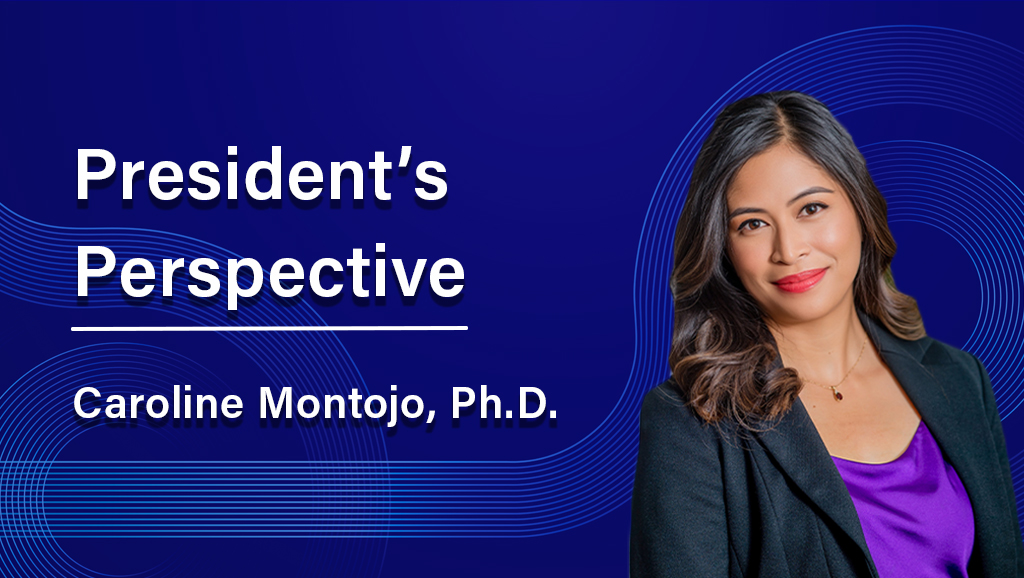President's Perspective
Shaping Neuroscience for Societal Good: SfN Reflections

Earlier this month, the Society for Neuroscience (SfN) annual conference in Chicago welcomed over 20,000 attendees to discover new ideas, share about neuroscience research, and network with others. The Dana Foundation hosted and participated in several events throughout the conference, including our inaugural Dana Center Initiative grantee meeting, a Dana Reception for Neuroscience & Society, the SfN Brain Awareness Week Campaign event, the Dialogues Between Neuroscience and Society lecture, and the Dana-sponsored SfN Science Educator Award ceremony. This provided an excellent opportunity for the Dana Foundation’s staff to engage with our grantees, partners, and colleagues committed to advancing neuroscience for societal good.
I came away feeling inspired by the many people dedicated to neuroscience’s positive impact in the world. Some of the most meaningful conversations I had were with early-career scientists working at the intersection of neuroscience and other fields such as ethics, law, social sciences, and public engagement.
At one Dana Foundation event, an early-career neuroscientist told me about her work training undergraduate neuroscience students to teach in local high schools, a “train-the-trainers” model, aiming to foster young students’ interest in brain science and their pursuit of more neuroscience training. Another attendee shared that her engagement with local communities helped her to see how societal needs and values can inform new research questions. This community-partnered work instilled in her a renewed personal sense of meaning and commitment to pursuing a graduate degree in neuroscience. Across these different stories from the next generation of scientists, a common thread emerged: a commitment to using neuroscience to create positive societal impact.
Inaugural Dana Center Initiative (DCI) Grantee Meeting
A highlight of the conference was the inaugural Dana Center Initiative (DCI) Grantee Meeting, which brought together the three sites spearheading the DCI vision: to create a new paradigm for neuroscience that centers societal goals and community values throughout the research process.
- Loyola University Chicago (Loyola)
- Mass General Brigham (MGB)
- University of California, Los Angeles–Charles Drew University of Medicine and Science (UCLA-CDU)
Each site aligns with one of the Dana Foundation’s core pillars: education (Loyola), training (MGB), and public engagement (UCLA-CDU).
The DCI meeting was a full-day event, where grantees had a chance to meet one another in person, present their work, and discuss the early outcomes and impact of their research.


Loyola University Chicago: Ethics-Infused Neuroscience Education
A common challenge in STEM education is the lack of engagement with societal issues, which can alienate students from underrepresented backgrounds. To address this issue, Loyola is integrating ethics into neuroscience education for middle and high school students, encouraging them to explore research careers while building STEM identities linked to societal goals and community values. With neuroscience offering insights into the human condition, it provides a natural connection between science and society.
The program at Loyola, led by Bill Rochlin, Dmitri Morgan, Liz Wakefield, and Joe Volkov, aims to demonstrate the relevance of STEM to real-world issues, encouraging broader participation and interest in neuroscience. The hope with this program is to establish a conceptual foundation within potential future scientists where STEM topics are paired with ethical considerations throughout the research process.
Mass General Brigham: Neurotech Justice Accelerator
The newly launched Neurotech Justice Accelerator at MGB—established as the latest Dana Center for Neuroscience & Society—focuses on interdisciplinary research training. Co-directors Theresa Williamson, Gabe Lazaro-Munoz, and Francis Shen will train Dana Fellows in the responsible application of neurotechnology in both clinical and legal contexts. The goal is to prepare future leaders to navigate the ethical challenges posed by rapidly advancing neurotechnologies, establishing standards to promote responsible societal use of these technologies, and, ultimately, protecting the public from potential neurotech harms.
UCLA-CDU: Community-Partnered Neuroscience
The UCLA-CDU Dana Center for Neuroscience & Society is leading the way in community-partnered neuroscience, ensuring that education, research, and policy efforts are informed by the expertise and needs of historically underrepresented communities. The initiative is driven by an outstanding team: Ashley Feisinger, Amy Woods, Gina Poe, Helena Hansen, and Denise Shervington. Their approach aims to place community engagement at the core of neuroscience practice to build genuine partnerships and develop new systems of knowledge production as a result of prioritizing collaborations with the communities.
Neuroscience & Society Reception
Our Neuroscience & Society Reception provided a platform for early-career neuroscientists to connect with cross-disciplinary mentors, and welcomed over 150 attendees. The goal of the event was to foster meaningful relationships between mentors and mentees, helping early-career neuroscientists navigate the challenges of building careers that bridge neuroscience with other fields.


For those interested, keep an eye out for announcements from the Dana Career Network in Neuroscience & Society and register early next year to participate in this valuable event.
Recognizing Excellence: SfN Science Educator Award Winners
We were also honored to sponsor the SfN Science Educator Award, which recognizes individuals making outstanding contributions to public education and awareness in neuroscience. This year, we celebrate the achievements of:
- Theanne Griffith, Ph.D. (University of California, Davis): Dr. Griffith’s commitment to increasing diversity in science is reflected in her work as an author of both fiction and nonfiction children’s books. Her popular chapter book series, The Magnificent Makers, introduces young readers to STEM concepts, and she also co-authors nonfiction companion books for Netflix’s Ada Twist, Scientist.
- Emma Yhnell, Ph.D. (Cardiff University): A first-generation academic with expertise in biochemistry, behavioral neuroscience, and clinical trials, Dr. Yhnell has dedicated her career to making science accessible and engaging for the public. Through her dynamic approach to public engagement, she bridges the gap between science and society, delivering content at international events and creating interactive experiences in her community.
Acknowledging Our Team and Partners
These events would not have been possible without the dedication and thoughtful planning of our Dana Foundation team: Khara Ramos, Farron McIntee, Shawna Bonilla, Ishan Dasgupta, Kathleen Roina, Devon Collins, Rachel Wurzman, Brandon Barrera, and Seimi Rurup. We are grateful for their hard work in creating inclusive, enriching experiences for our grantees and partners throughout the conference.
We also extend our gratitude to SfN, President Marina Picciotto, and Executive Director Marty Saggese, for hosting this annual gathering that brings the neuroscience community together to exchange ideas and discuss the future of the field.


Recommended Reading

Advancing Neurotechnology Responsibly: The Power of Collaboration

Strengthening Public Understanding of Brain Science Through Health Practitioners

